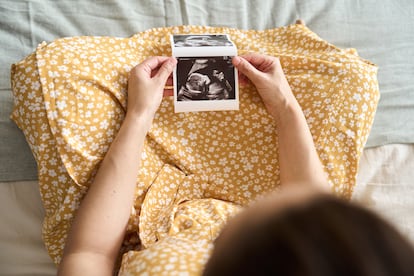Pregnancy denial: Going into labor without even knowing you are pregnant
This psychopathology occurs in one in 300 pregnancies and can last late into gestation or even up to the birth itself. Because of the shock for many women, who have not experienced physical changes or symptoms and have not had time to prepare for their child’s arrival, they sometimes need psychological help

Silvia (a pseudonym) experienced pregnancy denial in 2020. At the time, she was 22 years old and had gone to the doctor to ask if the ovarian cancer her mother had when she was young could be genetic. She left the appointment having found out that she was 38 weeks pregnant. “At the time, it was a real nightmare for me. I wasn’t expecting it, and I didn’t have any intention of having children yet,” she says. Her son was born a week later, amid endless fears and insecurities. “A pregnant woman prepares throughout her pregnancy for delivery, and I barely had a week... I hadn’t read anything about it, I hadn’t gone to childbirth preparation classes or [had any] checkups. I didn’t know anything at all. I had no choice but to do everything I could to make sure it went as well as possible,” she explains. Silvia needed psychological help to assimilate the news and begin to go through the transition to motherhood without fear. Today, not only has she assimilated it, but she says that her nearly three-year-old son is the best thing that has ever happened to her. “It’s an experience worth having,” she says.
Pregnancy denial is a psychopathology that some studies — such as Simermann’s 2018 article “Outcome of Children Born after Pregnancy Denial”— estimate occurs in one in every 300 pregnancies. In these cases, both the woman and her relatives ignore her condition for part of the pregnancy or even until the end of it, because they don’t observe the usual physical changes and symptoms related to gestation, such as nausea or tiredness.
Psychiatrist Ibone Olza, the director of the European Institute of Perinatal Mental Health, explains that the origin of this pathology seems to be psychological mechanisms of psychic repression and deep dissociation between the conscious mind and the body. According to Olza, in many cases, it has to do with traumatic experiences in early childhood, many of which are related to abuse, attachment problems or emotional deficiencies.
Pregnancy denial can continue until a very late stage of gestation and even up to the delivery itself. Because of the shock involved, women usually require psychological help, which will involve different interventions, depending on how far along the pregnancy is. “When it is detected in the first two trimesters, there is an opportunity to work on aspects that may be hindering contact with the pregnancy and to explore the possibility of previous traumatic situations that may be hindering this bonding,” says Irene de la Cruz, a psychologist specializing in perinatal mental health. On the other hand, she says that when pregnancy is discovered in the peripartum period, it is important to conduct an exhaustive psychopathological evaluation and provide strong support in the postpartum period, since the news can have a major impact. “It is essential to delve into the woman’s experience, to inquire about the support she has, the existence of a partner involved in this process and to work on her desires and decisions,” says De la Cruz.

Natalia Juan Garrigues, a 26-year-old hairdresser, found out that she was going to be a mother in her 31st week of pregnancy. She had no symptoms or signs that made her suspicious. In fact, she underwent gastric bypass surgery for weight loss without knowing she was expecting a child. “I go a long time without menstruating, so it wasn’t unusual for me to go months without a period,” she says. In fact, taking medication to trigger her period led Natalia to buy a pregnancy test at the pharmacy in the first place. “I took the test without thinking that I was really pregnant, but both stripes appeared. And even so, I thought it would be a false negative, so I repeated the test, which came out positive again.”
After that, Natalia Juan Garrigues assumed that she could be six or seven weeks pregnant at most, since she had not experienced any obvious signs of pregnancy. In addition, as a result of her operation, she had lost 37 kilos (81.6 pounds); when she consulted several doctors about the “movements” she felt in her abdomen, they all insisted that it was gas. The day she found out she was pregnant, she went to the emergency room to check if it was true; her excuse was that she had been feeling discomfort for several days. “I told them I was a little early, but when they went to do a vaginal ultrasound, they quickly took out the ultrasound machine and went on to an abdominal ultrasound, with which they verified that I was 31 weeks [pregnant].” She left the office trembling and with her shoes off, looking at her husband in shock. They were just a few days away from having a baby.
The only thing that crossed Natalia Juan’s mind was that, if she did the math, she had the surgery while she was pregnant, at around two or three months. “No one would tell me anything, if the baby was okay, if it was sick; it was already too late for many follow-up medical tests, visits to the midwife... I felt very guilty, and no one would tell me anything,” she recalls. According to Irene de la Cruz, the fears and anxieties of women who experience pregnancy denial are different for each woman. However, they are often worried about not having taken care of themselves during pregnancy and not having gone for medical check-ups and that this could affect the baby.
Ibone Olza says that once pregnancy denial is diagnosed, it is essential for the woman to receive information and support and, especially, that she not be blamed for it; it must be understood that the woman has not concealed her pregnancy but that she was not aware of it. “Afterward, with or without support, these mothers have been observed to bond perfectly with their babies and are great mothers just like everyone else,” she adds.
Natalia Juan went into labor at 35 weeks. She says that the lack of information and the way the delivery went left her even more in shock: “When Noah was born, they showed him to me [but didn’t allow] skin-to-skin contact or any contact [at all]; they took him to the neonatal unit. Even though we were both fine, I didn’t get to see him until eight hours later.” In addition to not being allowed to be with her son, the lack of communication and breastfeeding difficulties (as a result of the separation from her son), she was fired from her job because, she says, “management was not interested in her taking maternity leave.” All these things combined to make the postpartum period very hard for Natalia Juan, who had only known she was pregnant for four weeks. “It has been, and still is, the most difficult stage of my life, but I am thankful because Noah is doing well; he is a very cute and active baby.”
Training healthcare professionals
Experts say that training healthcare professionals in pregnancy denial is essential. "Healthcare personnel must be educated and knowledgeable about this relatively common psychopathology. In 1 in 2,500 cases, it is diagnosed at the time of delivery," says perinatal expert Ibone Olza. In cases where women are not aware of the pregnancy until delivery, they can go into a state of shock and dissociation, so they tend to act automatically, in a state of total unconsciousness. At this point, the lives of the baby and the mother herself may even be in danger. Olza explains that when the mother learns of her pregnancy, she is perplexed about what has happened for a long time and feels tremendous guilt for having unintentionally harmed her child. The psychiatrist concludes that it is very important to understand that the woman was not aware that she was pregnant and she needs strong professional support and guidance.
Sign up for our weekly newsletter to get more English-language news coverage from EL PAÍS USA Edition
Tu suscripción se está usando en otro dispositivo
¿Quieres añadir otro usuario a tu suscripción?
Si continúas leyendo en este dispositivo, no se podrá leer en el otro.
FlechaTu suscripción se está usando en otro dispositivo y solo puedes acceder a EL PAÍS desde un dispositivo a la vez.
Si quieres compartir tu cuenta, cambia tu suscripción a la modalidad Premium, así podrás añadir otro usuario. Cada uno accederá con su propia cuenta de email, lo que os permitirá personalizar vuestra experiencia en EL PAÍS.
¿Tienes una suscripción de empresa? Accede aquí para contratar más cuentas.
En el caso de no saber quién está usando tu cuenta, te recomendamos cambiar tu contraseña aquí.
Si decides continuar compartiendo tu cuenta, este mensaje se mostrará en tu dispositivo y en el de la otra persona que está usando tu cuenta de forma indefinida, afectando a tu experiencia de lectura. Puedes consultar aquí los términos y condiciones de la suscripción digital.









































